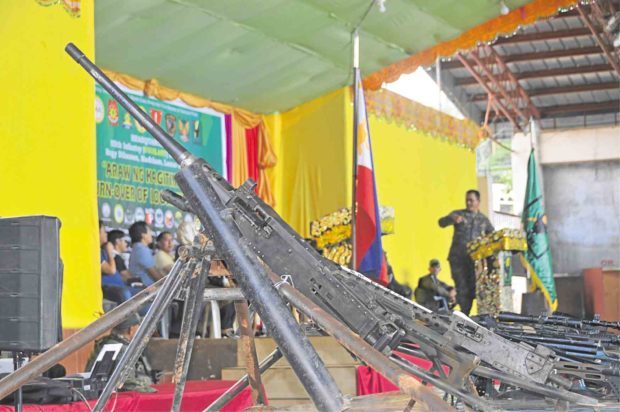Martial law disrupts Moro love affair with guns

Guns turned over by officials and residents of at least 10 towns in Lanao del Sur are presented to the military on April 9 in Madalum town. —DIVINA M. SUSON
MADALUM, Lanao del Sur — The love affair with guns by residents and officials of 10 towns in the province could be nearing its end as dozens of firearms, all unlicensed, had been turned over to an Army team that would pry the weapons forcibly out of their owners’ hands if these had not been surrendered.
The impact of martial law was being felt among townsfolk and community leaders who had treated guns as family heirloom, status symbol and security shield.
Among those who gave up their guns was the family of Rakeem (not his real name) who owned at least 20 firearms, some of them high-powered.
Like many Moro families, Rakeem’s kept guns because of a rido, or clan war, with another family.
Heirloom
Article continues after this advertisementOne mayor, Darogoran Mindalano, of Madamba town, gave up his Thompson submachine gun which he said had been handed down from his uncle.
Article continues after this advertisement“This is considered a family heirloom,” Mindalano said.
On April 9, Rakeem and Mindalano were among dozens of other individuals from this town, who turned over their firearms to the military.
“They assured us that it would be safe for us to do so,” Rakeem said.
“They said we do not need those firearms anymore and soldiers are there to protect us,” he added.
Maj. Gen. Roseller Murillo, commander of the Army’s First Infantry Division (ID), said the disarmament campaign would help bring peace to this town and nearby areas, where residents also surrendered guns.
First step
The disarmament campaign, according to Murillo, had removed 163 firearms from the hands of individuals, who did not have licenses to own and carry firearms, from this town and the towns of Madamba, Ganassi, Lumbatan, Binidayan, Calanogas, Balindong, Pagayawan, Tugaya and Bayang.
Residents of Saguiaran turned over 32 guns, Murillo said. “This is the first step in attaining sustainable peace,” Murillo said.
“The presence and ready availability of high powered firearms in the province contributed to the likelihood, intensity and duration of armed conflict in Lanao del Sur,” Murillo added.
Saguiaran Mayor Macmod Muti said it was difficult to convince people to give up their guns. “For them, it was meant to be their protection,” Muti said.
Status symbols
Former Madalum mayor Sultan Usman Saranggani said for some, guns are status symbols.
Like residents of Lanao del Sur, residents of Maguindanao province were also gun lovers, according to Genuine Kamaong, mayor of Datu Piang town.
Kamaong admitted that guns were the source of trouble in the province.
To convince his town mates, Kamaong led the surrender of guns to the military. He turned over a prized M16 assault rifle.
“I hope with the peace processes in progress peace will finally reign in my town,” said Kadil (not his real name), a civilian who surrendered his homemade grenade launcher.
“I think it was really better not to have a gun,” he said.
“Lawless individuals would target you more if they knew you have one,” he added.
Maguindanao guns
From Datu Piang, the military recovered at least 16 guns surrendered by residents. These included homemade .50 caliber sniper rifles.
Maj. Gen. Arnel Dela Vega, commander of the Army’s Sixth ID, said since January the military had already collected 338 loose firearms in Maguindanao alone.
The figure was not even significant, he said, because the estimated number of unlicensed guns in the province was at least 25,000.
But Lt. Col. Gerry Besana, civil military operations chief of the Sixth ID, said government forces were determined to collect as many unlicensed guns as they could by pressuring local government officials.
House-to-house campaign
Besana said mayors were told by Army commanders to heed Directive No. 1 of martial law, which required the local officials to act with dispatch on crimes.
The Army also planned to conduct an inspection of all houses in Maguindanao to check for unlicensed firearms, he said.
He added that if mayors failed to enforce the martial law directive, “they can be held liable and possibly removed from office.”
Besana said the military knew that “there were still many loose firearms out there.”
He said the military would start the house-to-house campaign in Maguindanao in July.
The deadline for surrender of unlicensed guns in Lanao del Norte was set earlier.
Col. Robert Dauz, commander of the Army’s Second Mechanized Infantry Brigade, said local officials had until the end of April to convince constituents into surrendering illegal guns.
“After the grace period, those who did not surrender their firearms will be subjected to joint focused military operations,” he warned.
Murillo said based on estimates, there were at least 18,000 unlicensed guns in Lanao del Norte. —Reports from Divina suson, Richel Umel and Edwin Fernandez